Toxic ships, poisoned workers: How offshore companies import deadly asbestos into Bangladesh
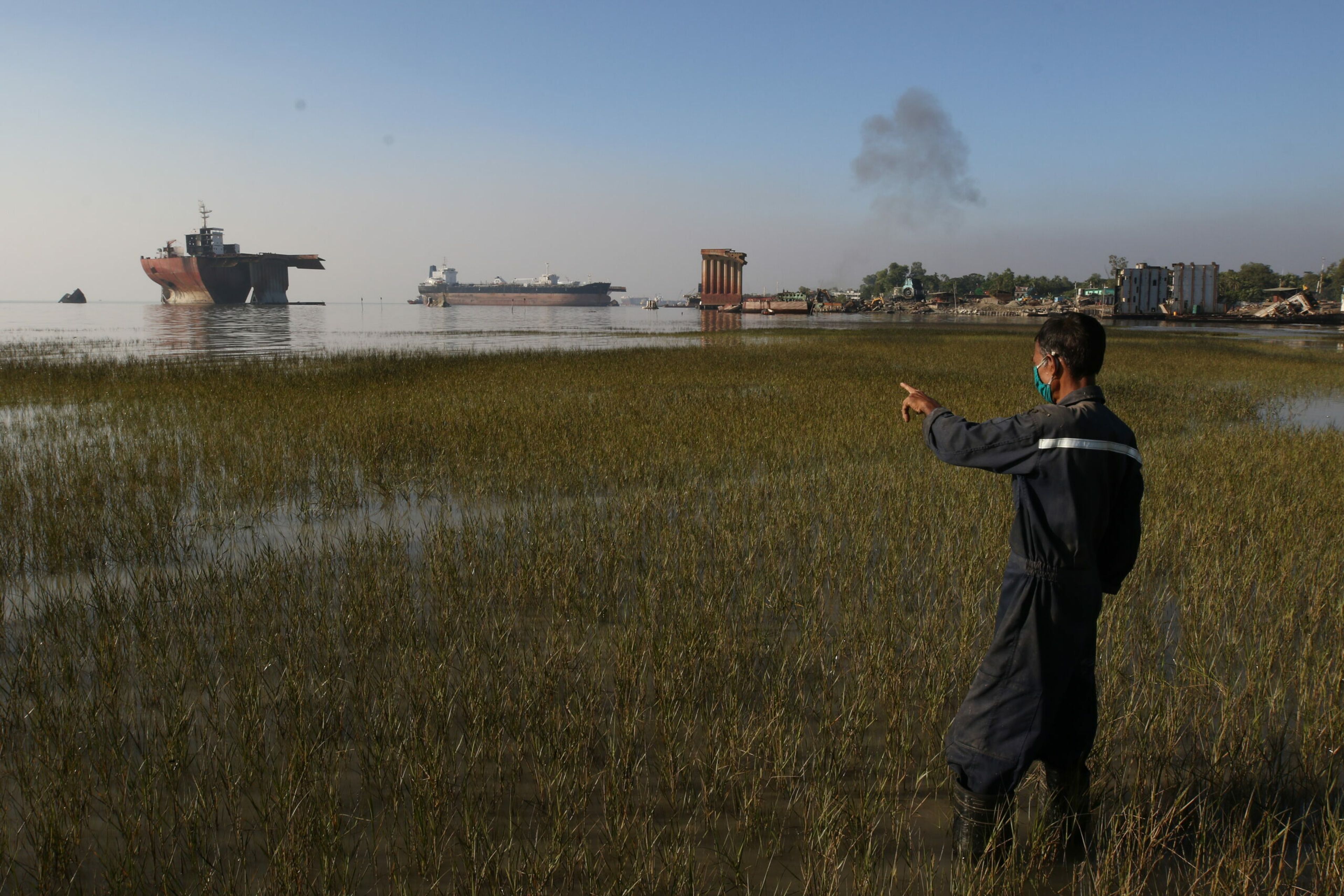
by Margot Gibbs and Mostafa Yousuf
In 2018, aged just 43, Mojidul Haque* developed severe breathing problems, consulted a doctor and was diagnosed with asbestosis, a potentially fatal respiratory disease which scars the lungs. After more than a decade working in the shipbreaking yards of Chittagong, Bangladesh, he lost his job, and the means to support his family.
“I’ve lost hope for life,” he said.
The disease is caused by prolonged exposure to asbestos, a material once prized for its insulating properties, but banned throughout the EU and many other countries because it is deadly to those who inhale its fibres. Its use remains legal in Bangladesh.
For most of his adult life Haque had been working with asbestos in the shipbreaking yards. A typical merchant vessel might contain around 10 tonnes of the material, hidden away in places like the engine room and fuel lines.
Haque wasn’t aware of the risks involved when he started work; he was given no training to work with the material, and wasn’t provided with equipment to prevent the fibres from entering his lungs.
Asbestos is rife in Sitakunda, the small town near Chittagong, where most of Bangladesh’s shipbreaking workers live and work. Furniture shops sell cheap “asbestos ovens” for as little as £2.20, popular with low wage workers.
The raw materials, say shopkeepers, are supplied by the shipbreaking yards.
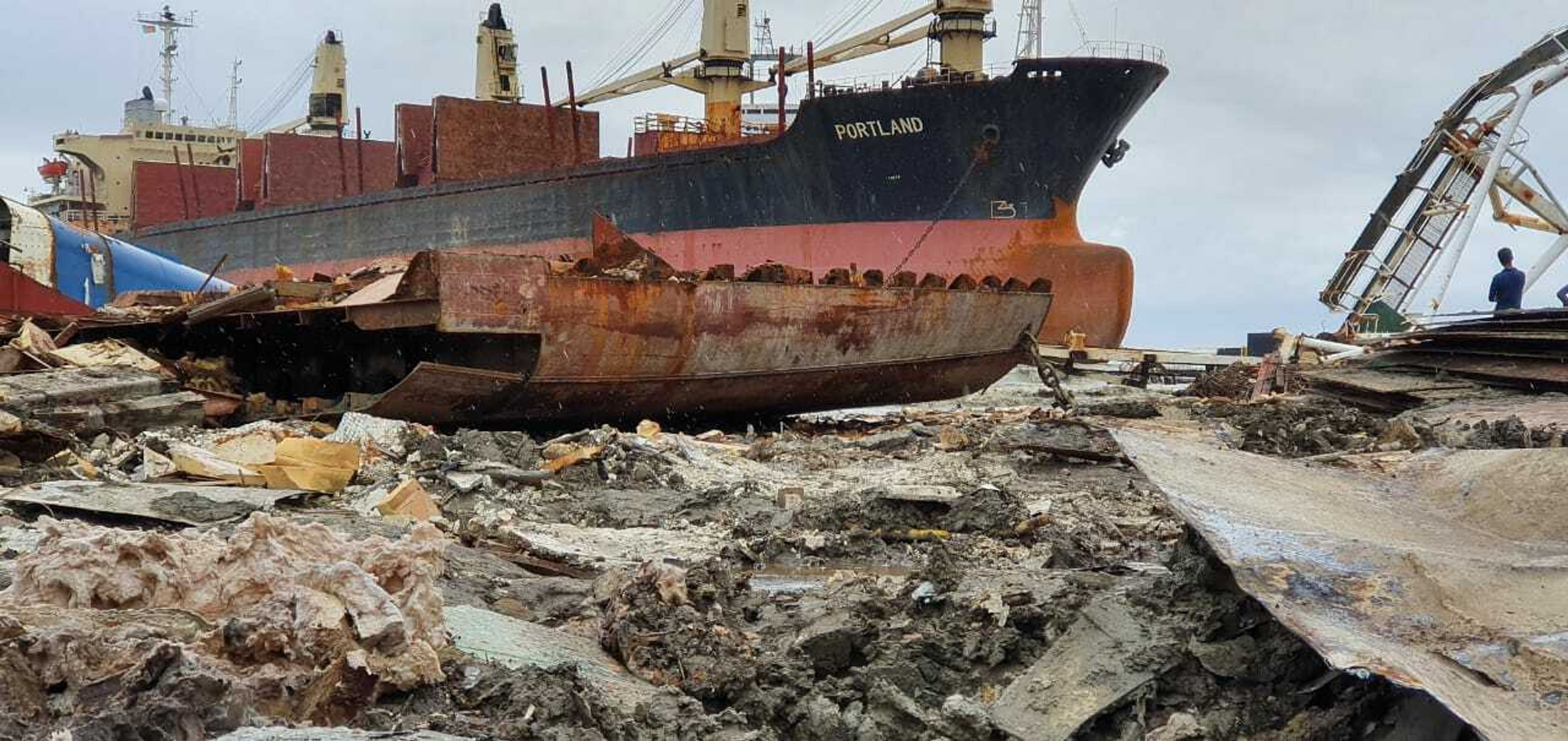
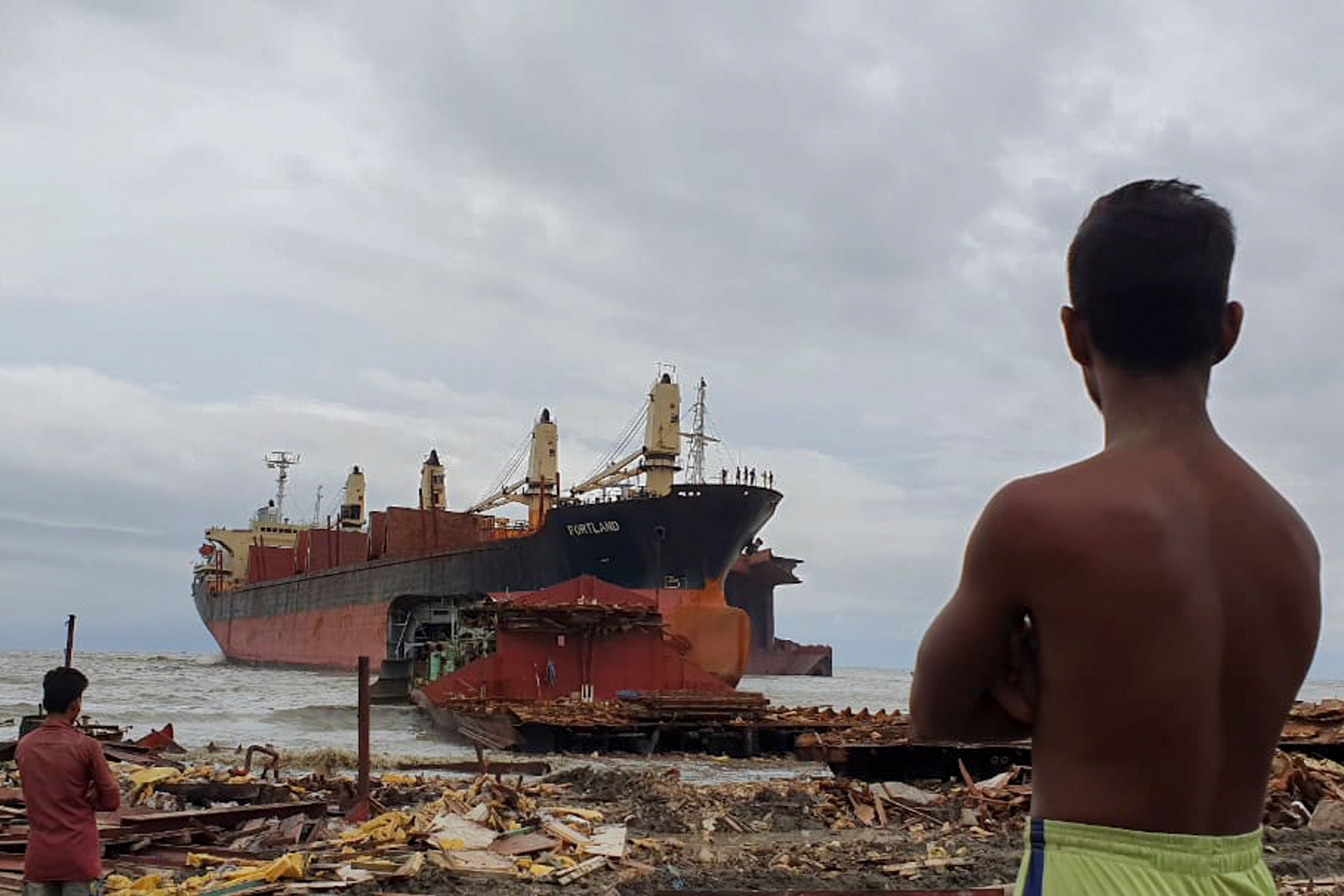
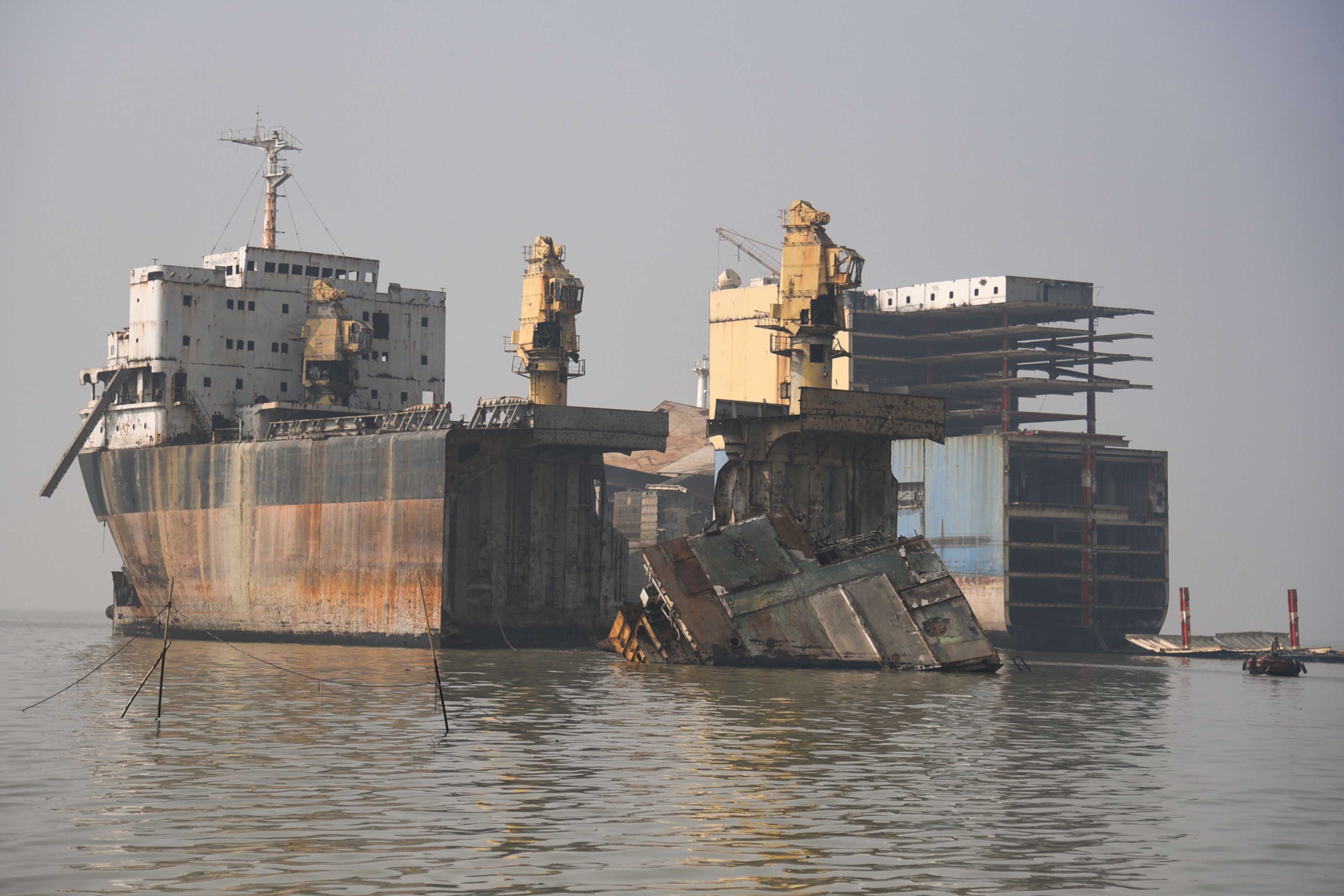
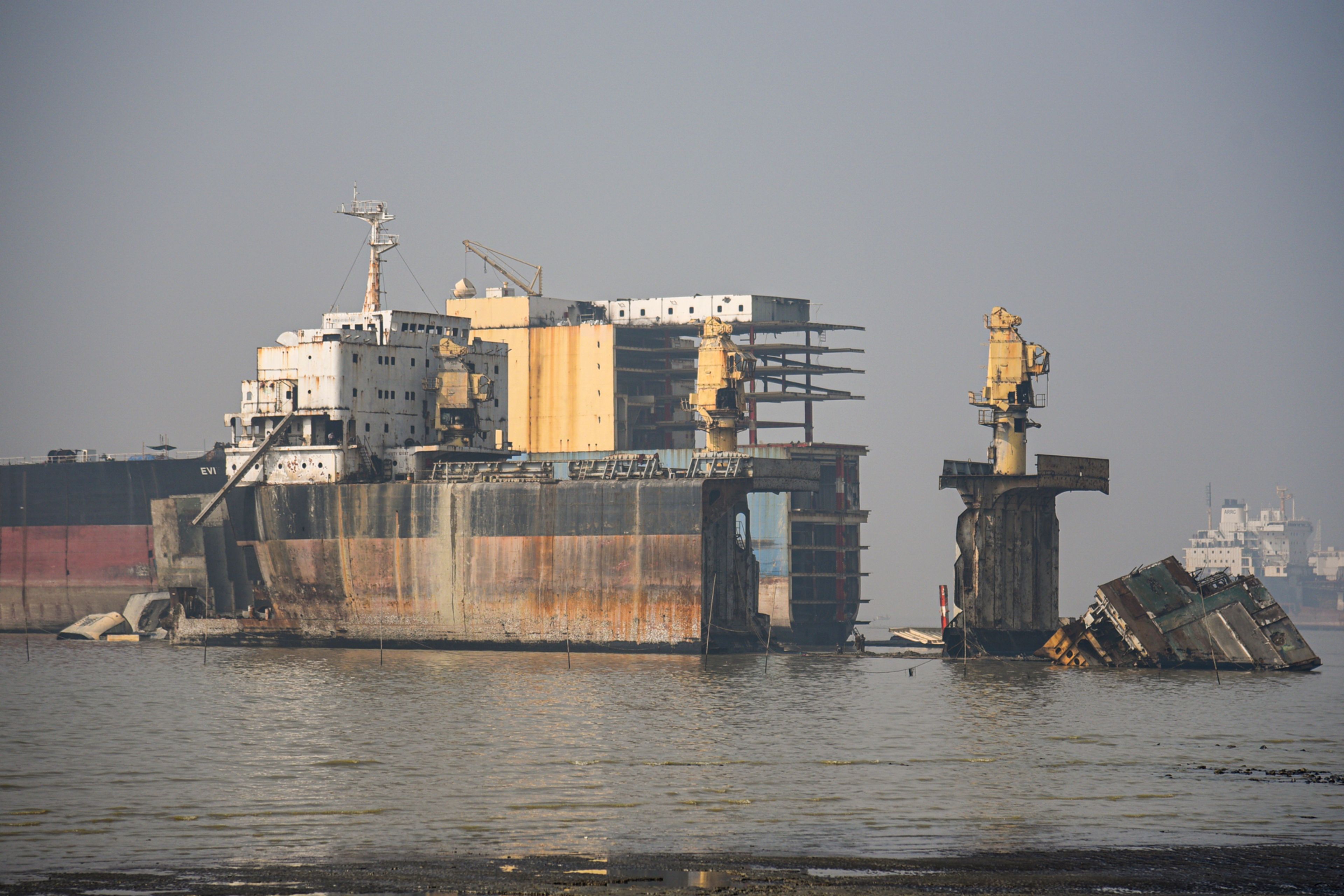
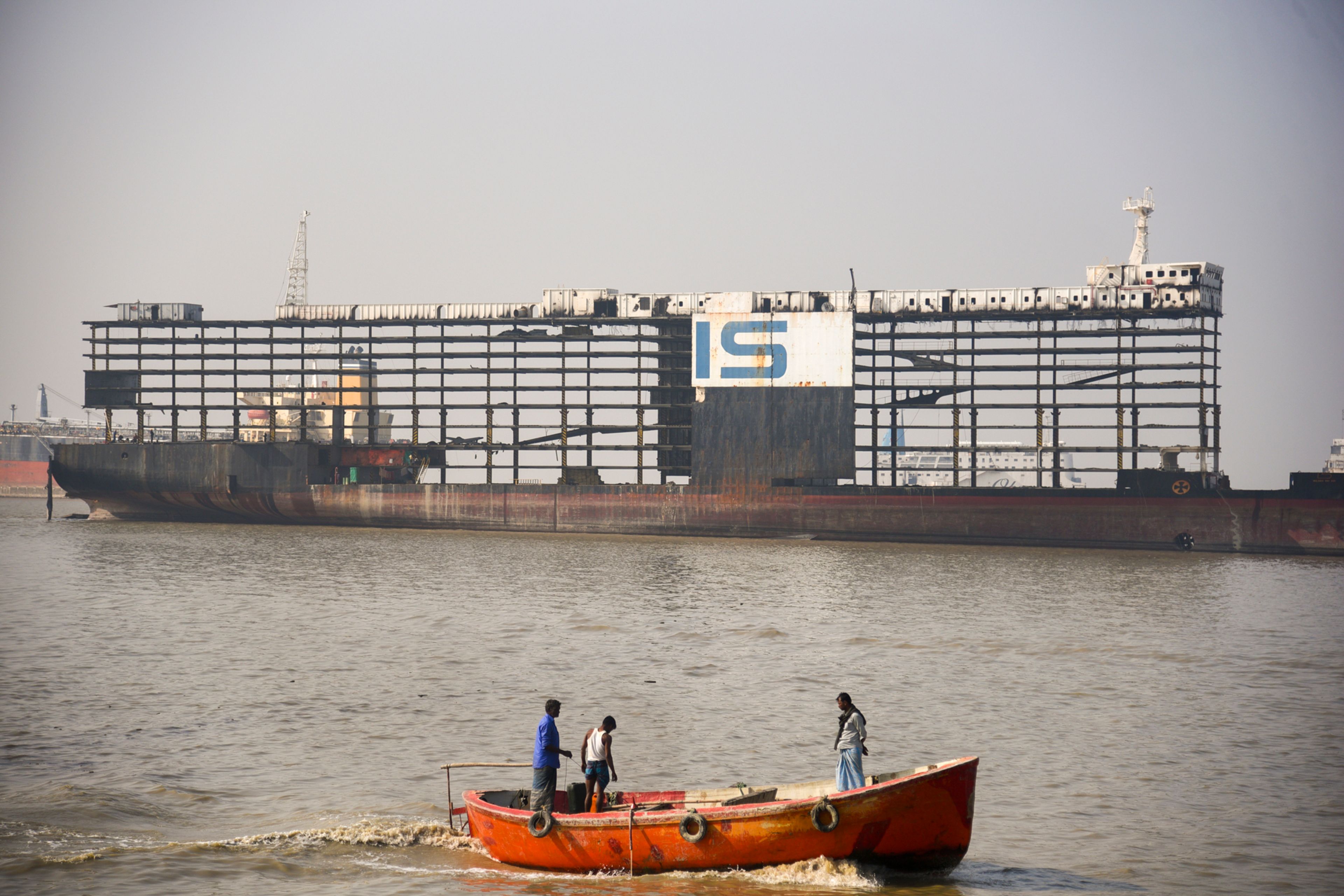
The powerful shipbreaking industry, which generates around half Bangladesh’s raw steel supply, has had a devastating impact on workers’ lives and the environment, and European shipowners are frequently shamed for sending their vessels to Bangladesh for demolition.
But nearly a decade after the government was forced by the Supreme Court to introduce rules to protect workers like Haque, an investigation from The Daily Star, a leading English language newspaper in Bangladesh, and Finance Uncovered, suggests that a major part of the country’s regulatory system is a sham.
These rules banned the import of vessels containing a range of hazardous materials including asbestos. And they demanded that shipowners submit certificates to the Bangladesh authorities declaring vessels have been “pre-cleaned” of these.
Our investigation obtained a cache of 28 such certificates. Each had been submitted to, and had been accepted by, the ministry of environment.
But respected ship recycling experts in Europe told us the documents were worthless. One branded them “rubbish”.
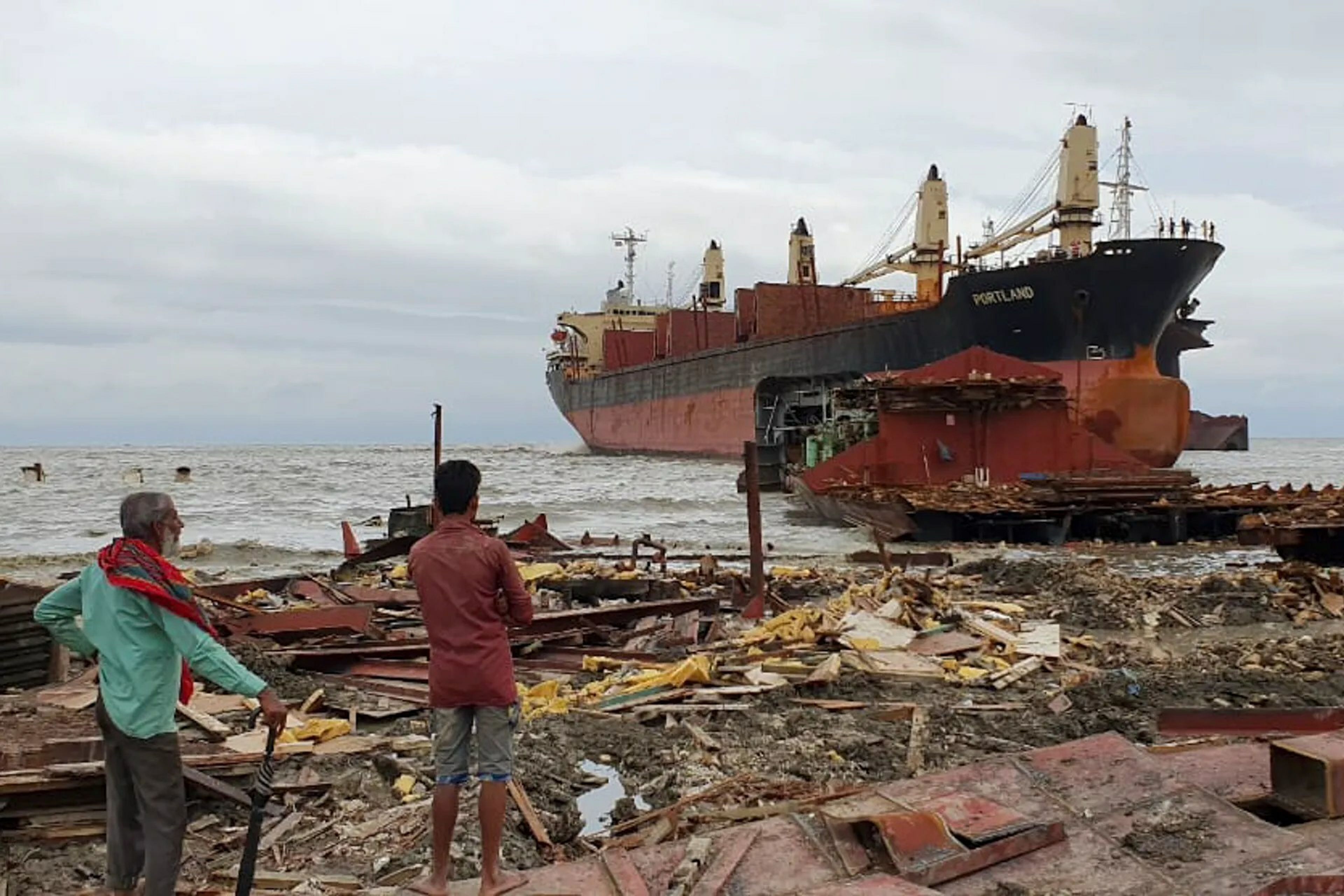
Although there is no suggestion this vessel contains asbestos, there are serious questions over the authorities’ verification systems (Credit: Daily Star)
Even government officials privately admitted to us the certificates are not realistic, but they insisted they do not have the means to check the declarations through meaningful inspections.
Md. Shahab Uddin, Minister Environment, Forest and Climate Change said that the ministry has plans to set up modernised laboratories to test such toxic materials.
He said: “As the responsibility is given to the Environment ministry to check the toxic material, we are determined to do whatever is needed to do to stop any malpractice.”
Of the 28 documents obtained by The Daily Star, 17 were from companies registered in secretive offshore tax havens, making it difficult to hold them accountable.
‘Fabricated’ documents?
Earlier this year, the country’s Supreme Court ruled in a case brought by the Bangladesh Environmental Lawyers Association (BELA) against the state in connection with shipbreaking regulations. Its judgment was damning: it found that documents used to import a toxic vessel for scrap in 2016 were “superficially prepared” or “fabricated”.
The findings of our investigation now suggest the issue may be widespread – with the role of offshore companies a key aspect.
Lawyer Syeda Rizwana Hasan, director of BELA, said: “Officials have been allowing vessels to enter Bangladesh knowing full well that the country has no preparation to deal with the waste.
“It’s time to go heavily against such malpractices to ensure that cash buyers and their allies in the government are held liable if they continue to resort to their heinous tactics.
She added: “Cash buyers are hiding behind anonymously owned offshore companies so we can’t hold them liable for the damage they cause.”
Dozens of workers in the Bangladesh yards have died in recent years according to local NGOs, but more still will suffer early deaths from their exposure to materials like asbestos.
Yet it remains the world’s leading destination for ships to go for demolition, and around one in ten of the vessels which arrive there were previously owned by European companies.
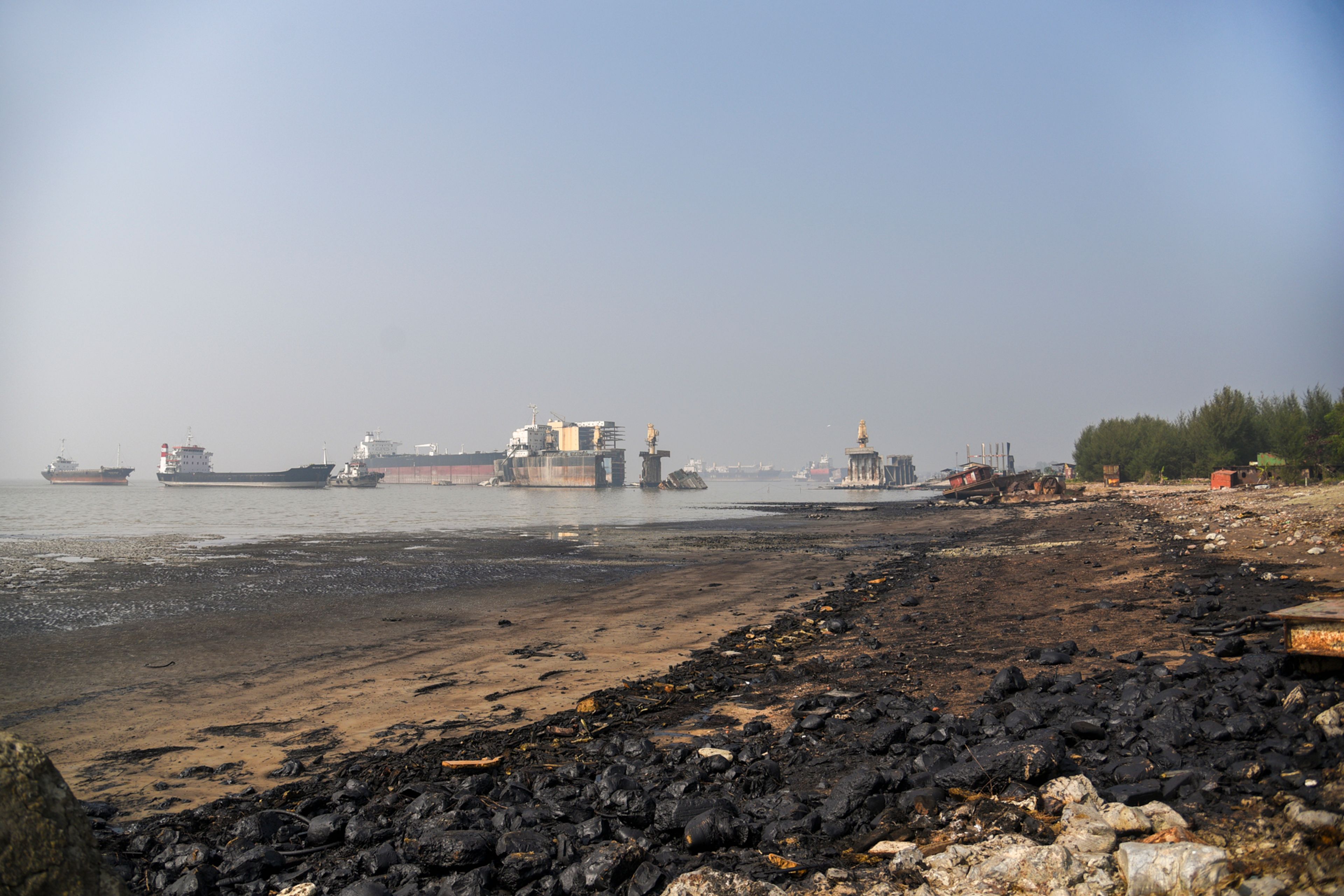
Oil pollution at Chittagong’s shipbreaking beaches in 2020. (Credit: Daily Star)
Multinational shipping firms appear to have distanced themselves from these deaths in part by selling their end-of-life vessels to so-called cash buyers, many of them based offshore where their ownership is kept secret. These companies specialise in sending ships to scrap but also provide a firewall between the yards and PR-conscious shipowners.
Ingvild Jensen, director of campaigning organisation NGO Shipbreaking Platform, said these companies should nonetheless be aware of what they are doing.
She said: “European ship owners send their end-of-life tonnage to the beaching yards because that is where they can make the highest profit. They ought to know that their vessels contain numerous toxic materials, including asbestos, and that the conditions at the shipbreaking yards in Bangladesh are appalling.This exploitation of poor coastal communities is for the financial benefit of an already wealthy shipping industry”
Bangladesh is a signatory of the Basel Convention, which is supposed to stop hazardous waste being dumped in developing countries. In 2009 the Supreme Court ruled that, in keeping with this convention, ships should be cleared of their hazardous materials before they are imported for demolition in Bangladesh.
Two years later, the government banned the import of ships for scrap containing materials such as asbestos. It also introduced rules requiring shipowners to provide certificates showing no hazardous wastes onboard.
An unenforced ban
Inspectors are then supposed to visit the ships at anchorage to check the vessels for hazardous materials before giving permission for scrapping.
But according to Hasan, by allowing shipowners to self-certify the waste they contain, the government set up a system which was bound to fail and open to potential abuse.
And when contacted by the Daily Star, the senior government officials charged with responsibility for shipbreaking appeared to be ignorant of what the rules demanded.
In its judgment earlier this year the Supreme Court found that the government had failed to implement this system in the case of the North Sea Producer, an ageing oil tanker previously owned by Maersk and sent from the UK to be broken up in Chittagong. The court found that the presence of hazardous materials on the vessel had been “deliberately concealed or left vague”.
It singled out a document supplied by a company based in the Caribbean tax haven of St Kitts and Nevis, claiming the ship contained no hazardous materials onboard, including “nil” asbestos.
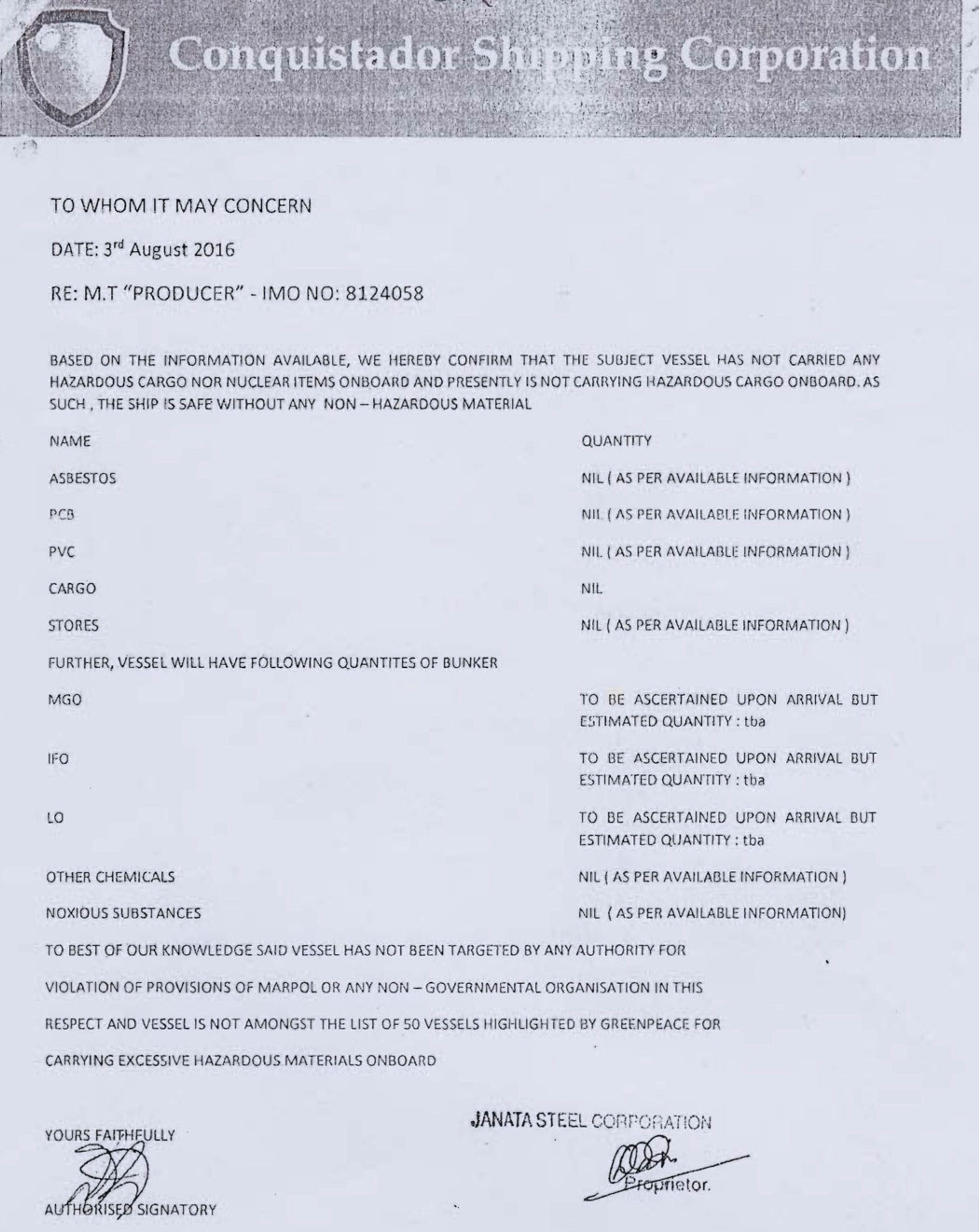
The certificate produced by St Kitts & Nevis company Conquistador which was singled out as ‘unverifiable’ by the Supreme Court.
It was later discovered that the ship had illegal levels of radioactive waste onboard, and according to documents submitted to the court, 500kg of materials containing asbestos was removed from the vessel.
The rules have been amended a number of times in the last decade, meaning that there has been disagreement over whether they required hazardous materials to be moved from the ship’s structure.
But the Supreme Court ruling in the North Sea Producer case directed the government to “stringently regulate” cash buyers and enforce the pre-cleaning system. Maersk has yet to comment on the matter.
Offshore Secrets
The pre-cleaning certificates obtained by the Daily Star contain identical wording to the North Sea Producer document.
Of the 28 certificates leaked to the Daily Star, half were submitted by companies based in secretive tax havens, including five from St Kitts and Nevis. Ownership of “offshore” companies like these – which stand to make million dollar profits on their deals – is a tightly guarded secret.
According to Hasan, cash buyers’ use of anonymous companies protects their true owners from potential liability for the damage they cause.
A third of the vessels in the cache used flags of convenience like Palau and St Kitts and Nevis, which are blacklisted by European port authorities for their poor enforcement of international shipping conventions.
Many of the certificates declare: “Based on the information available, we hereby confirm that the subject vessel [is] not carrying hazardous cargo nor nuclear items on board and presently is not carrying hazardous cargo onboard. As such, the ship is safe without any non-hazardous material.”
Around half the certificates then list the materials that the ships are clear from. First on the list is asbestos, frequently stating, “Nil – based on the available information”.
Wouter Rozenveld, who runs a ship recycling consultancy which works with yards in the EU, Turkey and China, said the declarations on the certificates are “rubbish”.
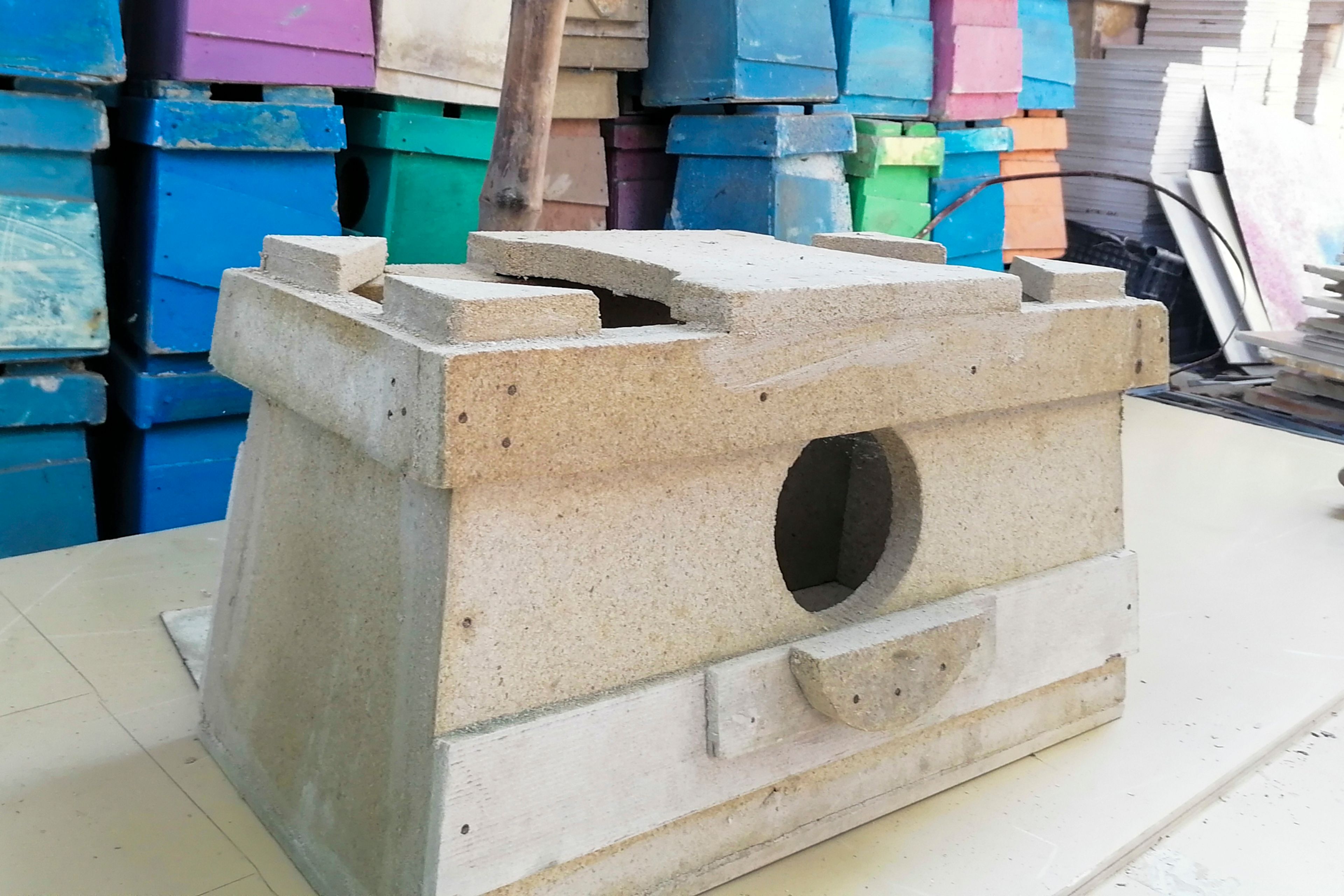
An ‘asbestos oven’ sold in the Chittagong area
Most ships headed for the beaches in south Asia were built decades before international rules banned the use of asbestos in shipbuilding in 2011.
“You’ll find asbestos in the gaskets, in the fuel lines, in the sea water lines, in the fire fighting lines,” Rozenveld explained. “You cannot operate a vessel without these things. The workers who clear this will in decades die of asbestosis.”
He said it would only be possible to clean a ship completely after cutting the ship down to its bare steel, which would take months of work from asbestos-trained workers.
“To do this removal would take a team onboard for three months and it would cost you millions.”
Another European expert, speaking on condition of anonymity, explained that the “This whole concept of pre-cleaning, it’s expensive: it’s extremely expensive and you’d only do it if you were going to scrap the ship in a good yard.”
He added: “We would always expect a statement of no asbestos on board to be backed up by some sort of evidence: what testing or sampling have they done?”
No checks
Mohammad Moazzom Hossain, director of Chattogram’s Department of Environment, told The Daily Star that it “exerts all efforts to ensure that ships are free of hazardous materials”.
But he said the department has no means of even testing for asbestos.
This means that the offshore companies’ claims that ships are “safe” for breaking are being accepted without any reasonable chance of being verified.
AKM Shamsul Arefin, who recently retired as head of ship recycling at the Ministry of Industry, says that the ministry was aware that asbestos would still likely be present in ships’ engine rooms, despite the claims made on the pre-cleaning certificates.
He said: “That is why we made it mandatory to have an asbestos decontamination room in the yard to make sure this poison does not go outside the yard.”
However, Department of Environment reports from this summer show that many of these decontamination rooms are not functional.
Officials at the Department of Environment and Ministry of Industry, speaking anonymously, admit that they are aware that the certificates do not accurately describe the hazardous materials onboard vessels.
But they say that the problem is that if authorities impose restrictions regarding this, the shipbreaking industry would not exist: if scrutinized thoroughly, poisonous substances would be found onboard every ship.
Pre-cleaning is expensive and a regime that strictly imposed it could mark the end for Bangladesh’s beaching yards. One of the main reasons that places like Chittagong are so popular for scrapping ships is that they are so cheap to use.
The International Maritime Organisation (IMO) is supporting Bangladesh in its efforts to bring yards up to standards set by the Hong Kong Convention, which sets out rules intended to protect workers and the environment from the damage they could cause.
Under that convention, all ships destined for demolition must have a full Inventory of Hazardous Materials, a detailed document marking the presence and location of all hazardous materials on the ship, along with a ship recycling plan agreed with the yard where recycling is set to take place.
But campaigners say that these rules themselves are unacceptable as they would continue to allow thousands of tonnes of hazardous waste to be dumped each year in Bangladesh, which the country has no means to deal with. They also argue such standards would contradict Bangladesh’s own apparent ban on importing hazardous materials in ships.
Those familiar with the practices in Chittagong say while some yards are making efforts to improve worker protections, far more is needed to satisfy Hong Kong Convention standards.
Without these changes, workers like Mojidul Haque are likely to be exposed to asbestos.
Workers unprotected
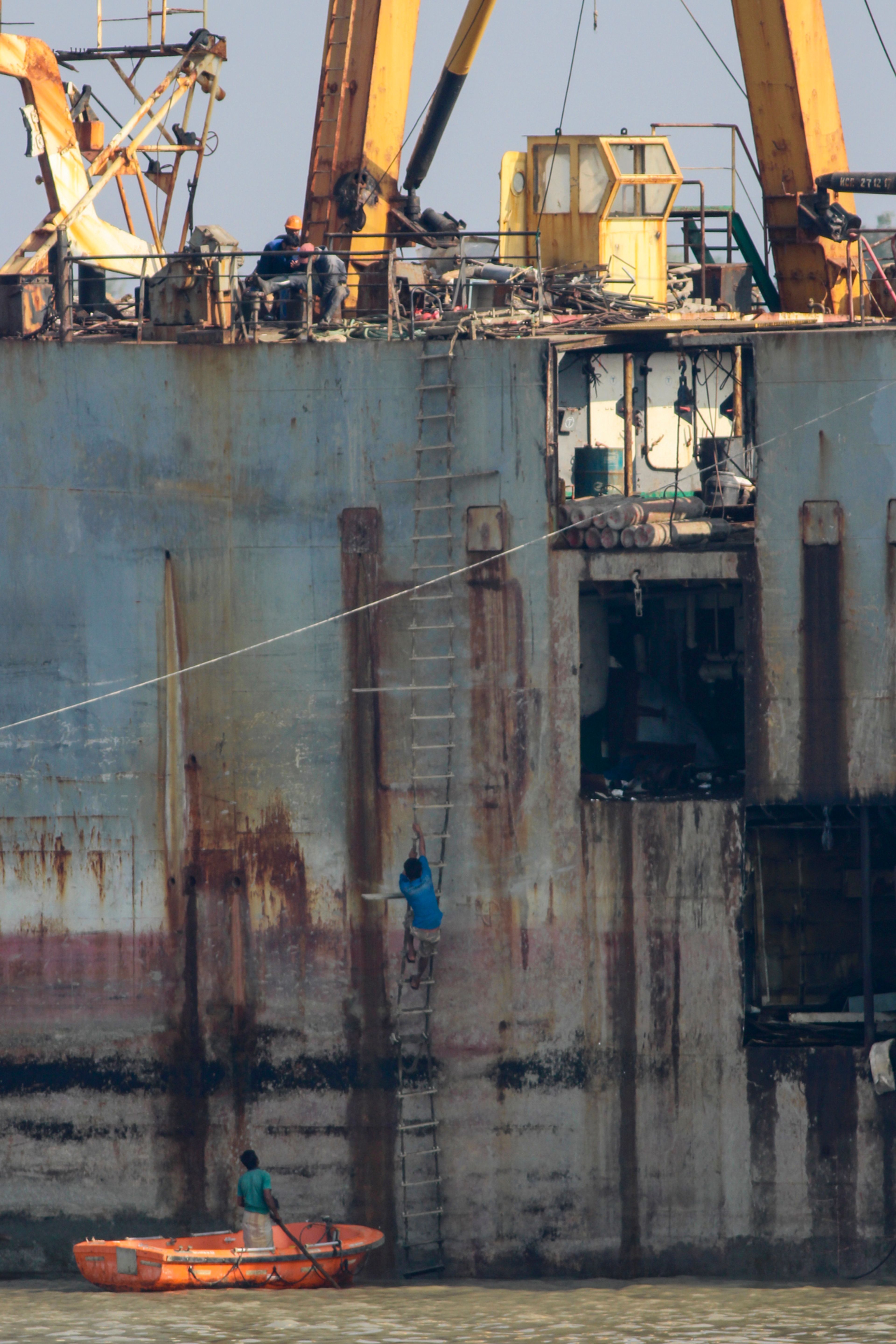
A worker climbs up a ship at a Chittagong yard, January 2020. Credit: Daily Star
The Daily Star talked to workers from five shipyards of Sitakunda about the protective gear and training they were given in their work.
Sahab Uddin says that when he started working in 2010 at Khawaja Ship Breaking Yard he received no training.
“I started dismantling ships at the yard as a cutter man back in 2010 with no knowledge of the risks…. I came to learn about the risk as I lost my fellow colleagues in accidents like explosion, suffocation or fire incidents”, he said.
And although the yards now make protective gear available, the workers often remove the protective gear they are provided under pressure to work faster.
Another worker, preferring anonymity, said that because the shipyards use loans to buy the vessels, they are in a hurry to pay them off quickly and avoid interest payments.
“That is why they want us to break the ship faster. The faster the ship is dismantled, the better for the owner. But it puts us at huge risk of accidents. We cannot wear proper protective gear fearing it would decelerate our speed”, he added.
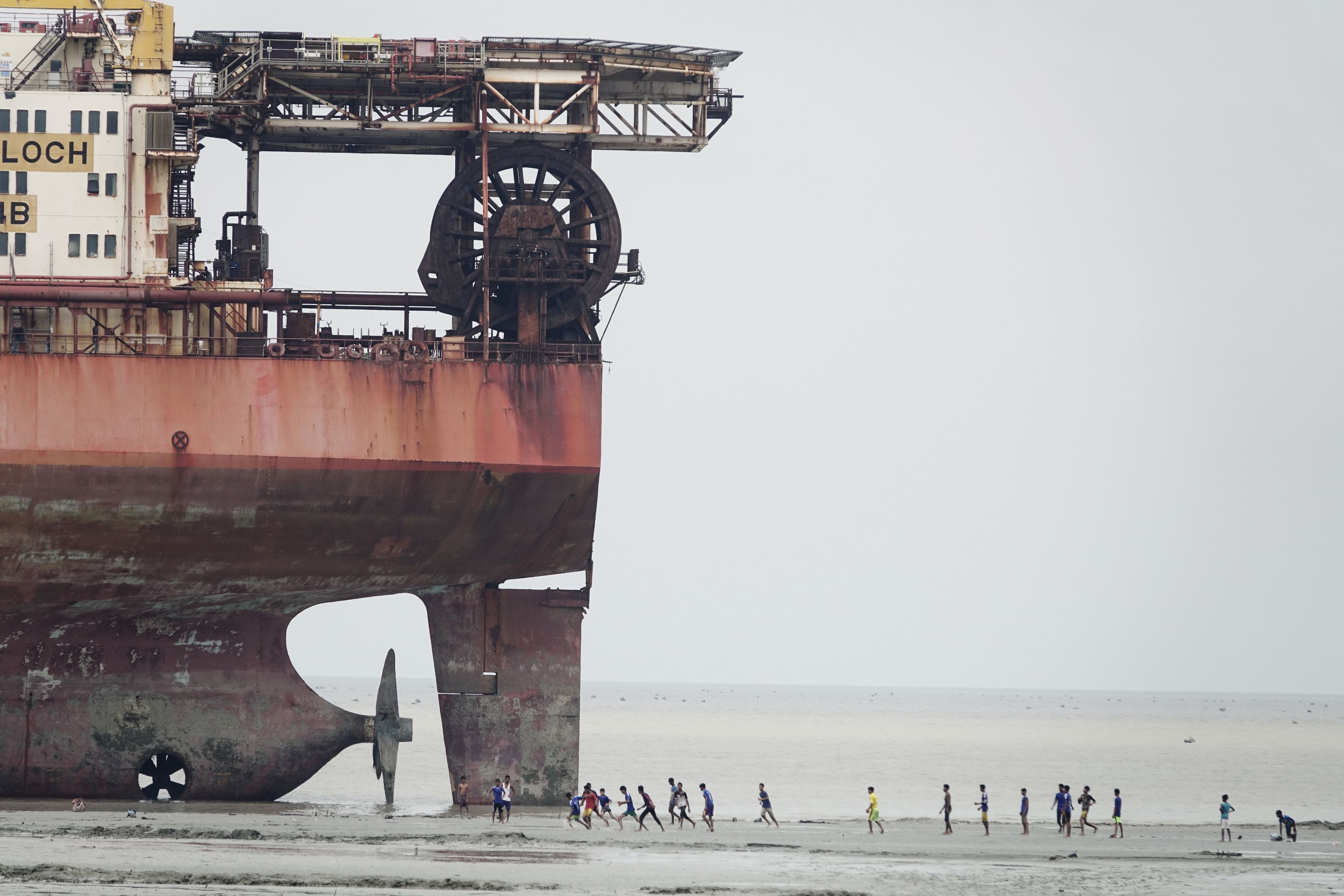
North Sea Producer in 2016. Danwatch/S. Rahman
We contacted leading cash buyers, Wirana and Global Marketing Systems (GMS) for comment on our article.
We asked them on what basis they made declarations that the vessels were free of hazardous materials, and whether they were based on an Inventory of Hazardous Materials (IHM).
Only GMS, the world’s biggest cash buyer, which also acted as the agent for the import of the North Sea Producer, provided a response.
GMS instructed London law firm Carter Ruck to respond. Nigel Tait, a partner at the firm, said in a response that pre-cleaning certificates were based on an Inventory of Hazardous Materials provided by the original shipowners, and “reputable third party surveyors and agencies who have conducted the pre-cleaning”.
However he also said the hazardous waste that forms part of the vessel’s structure would not be removed because it would create “safety issues while sailing”.
He said there was no legal requirement to strip back ships to their bare steel to remove all hazardous materials from the ships’ structures.
“Our client ensures that, in compliance with the Sustainable Ship and Offshore Recycling Programme, the relevant green teams (with hazmat experts) inspect the vessel and mark all potential parts/material that could contain hazardous material.”
Where asbestos was identified, he said, “separate asbestos decontamination rooms are provided for individual yards in Bangladesh and safely disposed of in a vertical concrete column.”
He maintained that GMS had acted legally throughout.
Now unemployed, Mojidul Haque is struggling to support his wife, mother, two sons and daughter. They are currently living on micro-loans, but he has no idea how he will repay them.
At the point of despair, he is now working to raise awareness about the deadly issue. He has urged the government to make sure workers are no longer exposed to asbestos.
Without that, many more workers like him will continue to suffer.
READ MORE ABOUT THIS STORY:
- Revealed: The UK company and Caribbean tax haven cashing in on one of the world’s deadliest trades – shipbreaking
- ‘A moral crime’: Leaked contract reveals how shipowners wash their hands of toxic vessels via offshore world
* Moijidul Haque is not the subject’s real name. He requested anonymity over fear of reprisals.
** This article was a joint investigation between Margot Gibbs of Finance Uncovered and Mostofa Yousuf of The Daily Star in Bangladesh. The Daily Star version is here.
*** Editing by Ted Jeory and Nick Mathiason